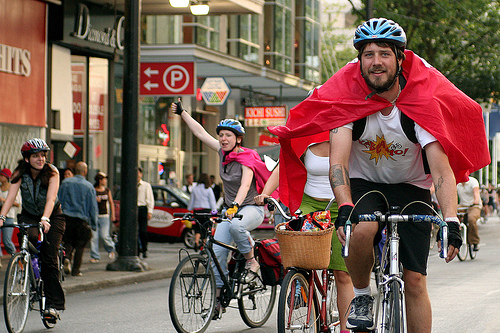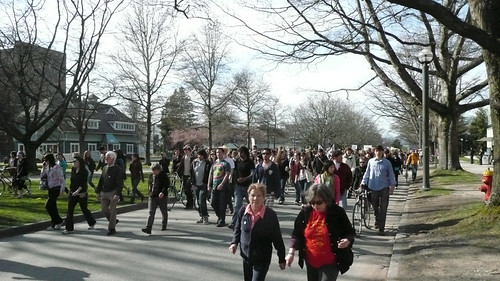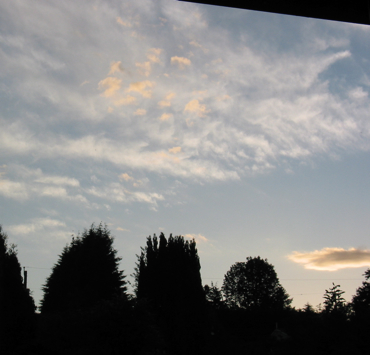
Cyclists on Robson St. Photo by cabbit via Flickr.
As Vancouver’s City Hall proposes another separated bike lane, this time on Hornby Street which currently has just a regular bike lane, the usual bike vs. car debate fires up again. I don’t see it as a choice of one over the other; we all have to get along. But as a cycling advocate and addict (and the daughter of another — I like to joke that my father was practically born on two wheels), I’d like to share some ways in which bikes make our city a better place, without getting too much into the anti-car realm here. Certainly thinking of these benefits makes me even more resistant to ever using my driver’s license for its primary purpose. The last time I used it was to hand it over so I could test ride a bike!
1. Bikes are the ultimate zero-emission vehicle.
I think we all understand that clean air is vital. Cycling contributes to cleaner air by taking pollution-emitting vehicles off the road. Having fewer cars on the road results in less traffic congestion, which should in turn reduce pollution further. Because bikes require no fossil fuels to operate (let’s not get into a debate over what fuels the human because everyone eats regardless of their mode), there is reduced strain on our non-renewable resources. We all know oil extraction has catastrophic environmental impacts even without oil spills.
Bikes are extremely efficient and use less materials. On the other hand, “These 1,300-kilogram metal boxes carry on average one-and-a-half people, approximately 130 kilos — a mere 10 per cent of the vehicle’s weight” (Yves Engler, The Mark) and require 1,860 calories per mile, compared to 35 for a bicycle, according to the WorldWatch Institute.
2. Bikes take up less space.
Whether they’re parked in an apartment or on the street, riding on the road or a trail, bikes require less physical space than cars. And when you have more space available, this makes room for more useful and pleasant aspects of a city: restaurant patios, parks, street food, community gardens, street performers, art installations, and so on. A parking space is private space, not public, when a car is on it.
Continue reading Why bikes are good for Vancouver »
It’s the day after Earth Day and I’m on my favourite North Shore bus route. Lined by trees most of the way, including a park ravaged in the windstorm of a few years ago and a protected habitat area with beautiful deciduous trees, the two-lane Dollarton Highway can feel like a backcountry road. Certainly in the rear view mirror of my bicycle it can make me pretend I’m somewhere else.
The road was realigned and widened years ago, and I still remember the disappointment and shock I felt in staring at this huge, ugly, wrecked swath where they had pummeled through what I can only assume was old-growth forest. I had forgotten the image until a reminder came today.
Developers have been clear-cutting small chunks at a time to build two-story business operations. They’re not the ugliest buildings in the world and they did a fine job of either keeping perimeter trees or replanting, which is more than I can say for most areas. It’s a beautiful road, even, as roads go with its remaining forests. I know one treed part is doomed as it has a Colliers sign on it while the trees are still standing. Today I’m distracted by writing a different blog post on my iPod. In my peripheral vision, something has changed. Massive trees and mangled branches are heaped on bare ground where a magnificent, dense group of conifers had stood untouched for decades. My heart cracks open and a knot grips my throat. I’m paralysed for a moment by an aching sadness that becomes a desire to vomit as I pass existing cleared blocks and those currently spared, beautifully lush but damaged. I am overcome; my lower lip quivers and I wonder if anyone else has noticed the abrupt change and felt similarly.
Where we have something so irreplaceable, and that defines space so dominantly, I can’t grasp why we destroy it for a mere two-story building, parking lots, a gas station, a puny Tim Hortons drive-thru. We ignore opportunities to decrease our buildings’ footprints by building them compact to begin with or replacing old single-story ones with multi-story. There’s no shortage of this activity with houses in older neighbourhoods, so why do we treat our commercial spaces differently? Why are these formerly forested areas being developed now? Does anybody give a damn?

I’m going to miss out on this, I think, because it’s also World Oceans Day on June 8 and the World Oceans Day event I’m attending conflicts in time, but I wanted to pass this on for the rest of you. There are a few spots left I think, so register quickly!
Walking Around the World: Innovation and inspiration for Designing, Engineering and Planning our Cities
Dr. Rodney Tolley with Bronwen Thornton, Walk 21
June 8, 7 pm at UBC Robson Square, 800 Robson Street, Vancouver
Reservations required: Call 778-782-5100 or email cstudies@sfu.ca
“The obesity epidemic, congestion, pollution, peak oil and climate change are just five of the imperatives that demand we walk more — and walk more often. Yet the barriers to walking have intensified in recent years. This presentation will show how streets around the world are being opened up again to people on foot, with spectacular benefits for our personal health, and the health of our cities, our communities and our children.” (SFU City Program | PDF Flyer)
Continue reading SFU lecture June 8: Walking Around the World, and Car Free Day »

In case you’d been wondering, I didn’t die, fall ill or otherwise lose the ability to post to my blog. The desire, somewhat… but moreover I was too busy doing and thinking other things to even remember to post, and when I did I didn’t feel up to it or there was something of higher priority. (I had my New Entry page open, blank, for 12 days.) So why have I been so quiet? Long story short (long story is hopefully coming later but don’t hold your breath), I moved back to North Vancouver from my co-abode in Surrey. That was almost a month ago (my how time flies when one is busy!) and my new-old bedroom is still a mess so it’s been my priority over many things. Everybody here (my middle sister and her family moved back in two days before I did) has been in purge mode and digging through my old stuff I left behind has been eventful and interesting. The cause for the move back home I don’t wish to discuss in detail — so please don’t ask — but is simply that the two of us aren’t together anymore. Nothing simple about that but it’s a straightforward reason. More specifically I guess I could say I moved back home because living solo in Metro Vancouver is incredibly expensive if not unaffordable. So I’m here waiting out the housing heat wave and am trying to be optimistic about it.
On Monday I had a little adventure I’d like to share with you. It needed the above introduction to fully make sense of the context, but it’s kind of like the 8th story in a series because there is much to say for the previous weeks. We’ll start here for now.
Continue reading Topsy-Turvy or, I’m Not Dead »

It figures it’s been a month and a half since I wrote Part 1 and said it would be “a couple weeks.” I have a legitimate excuse, however: the topic on which I desperately wanted to write was (is!) getting bigger and bigger as news stories and blog posts flooded the papers and internet on the topic. An overwhelming amount of information to sort through, half of it’s out of date by now and much of it I haven’t yet read.
My blogging has been sparse at best lately, and this behemoth of a topic isn’t helping. Of course I’d also like to write about everything! But whilst I muster up the energy/time to do this, here are my key points:
– global food crisis overview
– modern agriculture… permaculture… what our monoculture system + pesticide/herbicide use did to our natural systems: reducing yield, damaging and polluting the earth, losing diversity, bringing in GMO which is proven to harm humans
– hoarding: it’s human nature
– food wastage (also see BBC article)
– oil: peak oil, pesticides, the benefits of local eating
– community and personal gardening
– developers get (potentially large) tax credit by turning land into “public land” while waiting for a project to get underway, then can install a community garden, makes them look socially responsible
PHEW!
Well, now that I’ve got a few hours of my life per week back from the brain-sucking, life-wasting machine called the Television (I watch mostly intelligent programming, but it’s TV nonetheless), I should have few excuses not to sit down and churn this out. Unless, of course, I get distracted by Stephen Rees’s blog.
And now it’s time for bed, but I will leave you with this tidbit and links, and inform you that I’m still alive!




